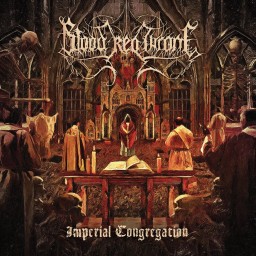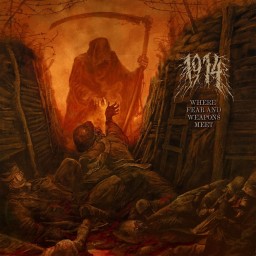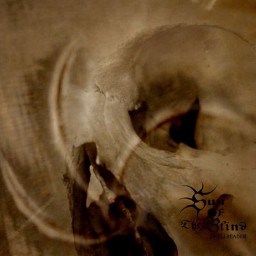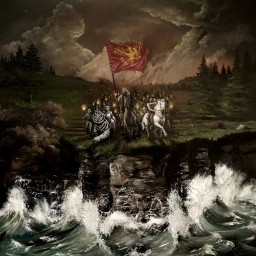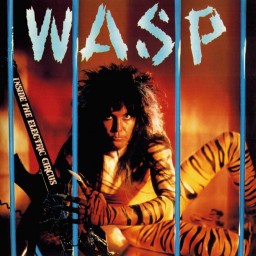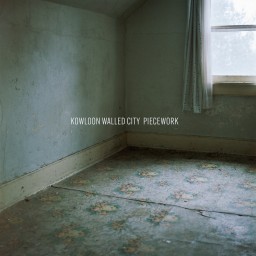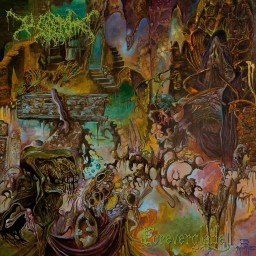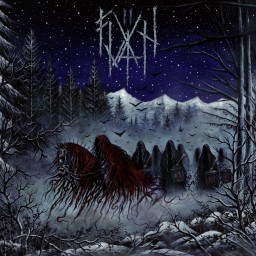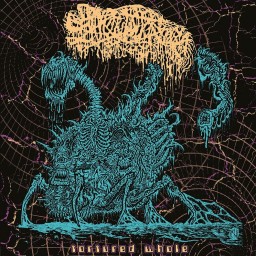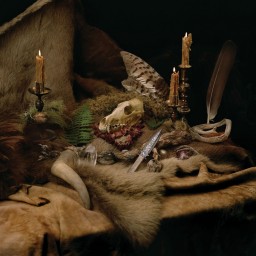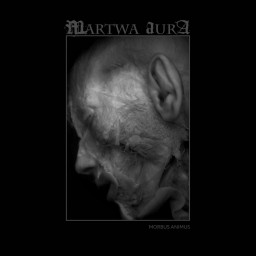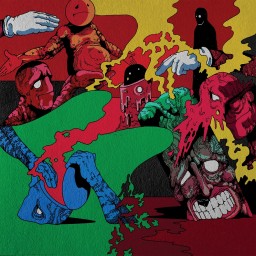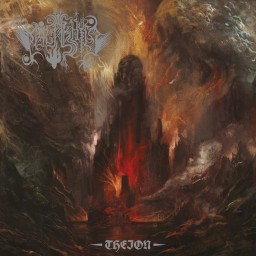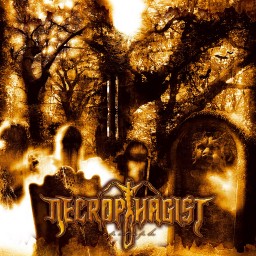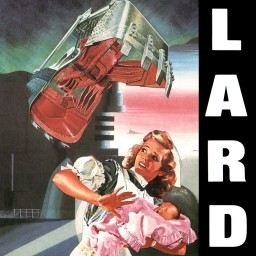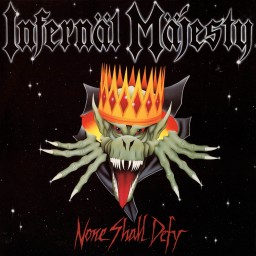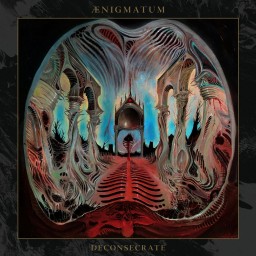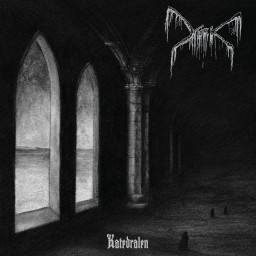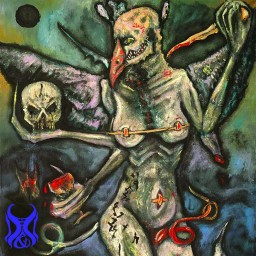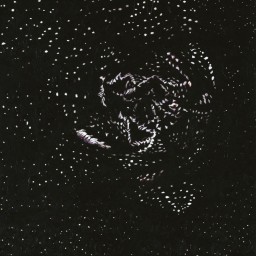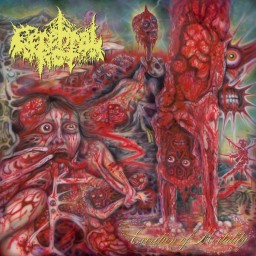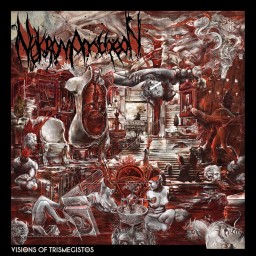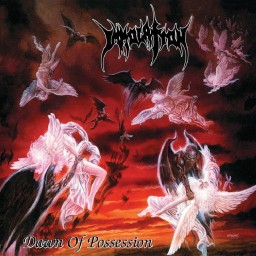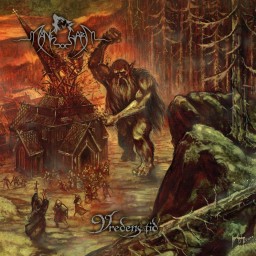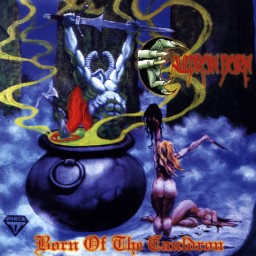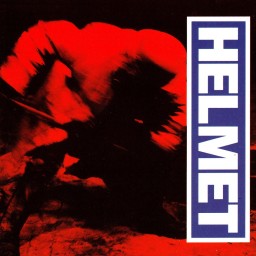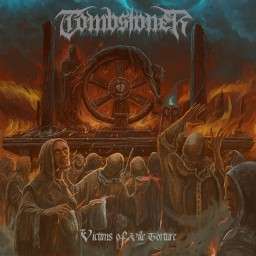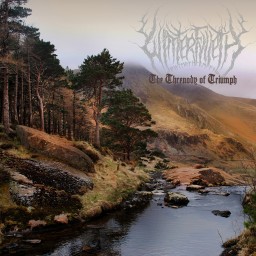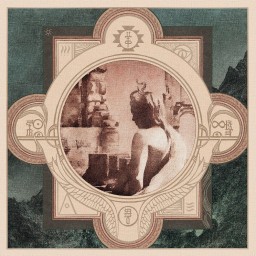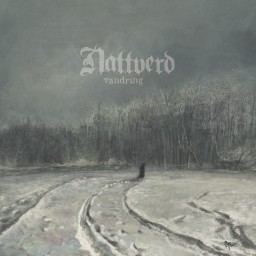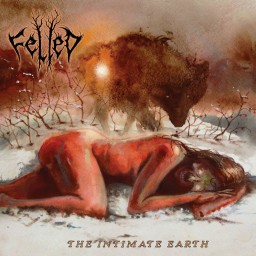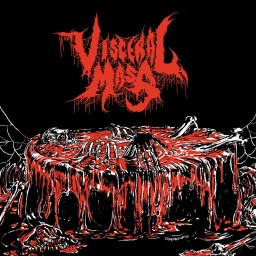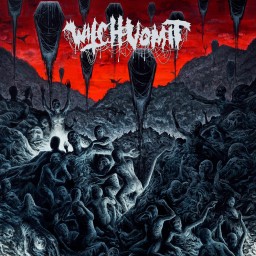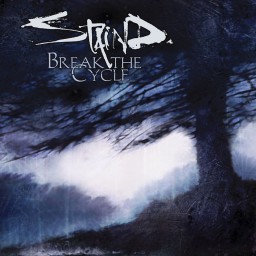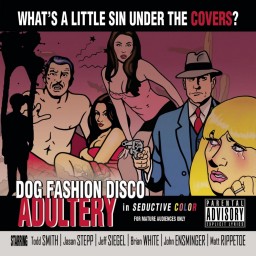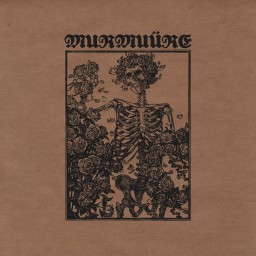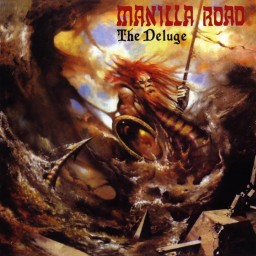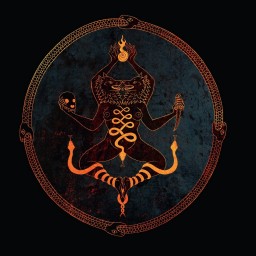Vinny's Reviews
Amidst all the typical bluster you would associate with modern day Cannibal Corpse, there is actually some intelligent stuff on Blood Red Throne's tenth studio outing. Alongside all the groovy riffs and frenetic pacing there are some hints of expansive scoping going on, resulting in the inclusion of some bass driven runs or downright infectious blackened elements being dropped in there also.
BRT's penchant for writing "bangers" is certainly underlined on Imperial Congregation with many tracks being written with as much mocking vehemence as the album title would suggest. Tracks like Transparent Existence are stacked full of catchy riffs that cannot fail to stick like some infesting parasite to your brain. This brand of no frills, memorable without being melodic, death metal is hardly rare nowadays but the Norwegians do it well, using every last one of their twenty-three years of experience to punctuate these standout moments on what could otherwise be considered to be a standard enough death metal record.
The shortfalls here are mainly that it does get far too involved in itself and if you are not careful you lose sight of the bits going on around the standard dm fare. Gundersen's bass is prominent in the mix, driving forward the sound of the band without ever becoming imposing or intrusive. When coupled with the solid and consistent drumming of Freddy this makes for quite a formidable force to be reckoned with. At times it feels like Gundersen is almost off doing his own thing behind those chopping riffs. However, this is why full attention is needed here when running through all ten tracks on offer. There is more to this album than charging pace, frantic solos and rabid riffs.
This is far and away a better album than the aforementioned Cannibal Corpse's effort earlier this year. Imperial Congregation has a stature and confidence about it that is obvious on even the weaker tracks. Never a band to rest on their laurels, BRT make for an intense listening experience on most of what they release and this latest opus is no different. The lead work ranges from odd blooping time signatures to full on melodic richness and whilst scoring precisely zero points for originality, this album manages to almost impose itself on you with its unrelenting delivery and in a way just letting it take you can reap real rewards.
The final two tracks do very little for me and so the album does tail off towards the end for me, either they ran out of material or hastily put together the last two tracks. Either way, it is reflected in the quality that these tracks are below par when compared to the other eight on show.
Genres: Death Metal
Format: Album
Year: 2021
Death metal is one of my go to genres. When combined with black metal it rarely takes on a form unbecoming to my battered eardrums. One of the reasons why I like death metal so much is there is not any particular need to listen to the vocals in terms of deciphering them and understanding any deep lyrical content behind them. Lyrics overall are of little interest to me in many ways although this does not mean I only like instrumental albums. With dm, bm and thrash it is all about the expression for me. It is fine for artist to write and sing about what they like of course but I do not need the details thanks. With less extreme music the lyrics are more important as there is not always an obvious means of expression as an alternative. I love the tales of the folk songs of bands like Panopticon, for example, however there is is even an element of cringe in some of the lyrics churned out in these circles sometimes also. What I also do not react well to is over telling of a story through an album (or repeated overly obvious storytelling across various tracks in an album). If you are going to engage in very forward recital of tales, myths or legends then make sure that all that is going on around it is enticing enough to enable maximum success.
1914 are very much an artist that I just do not understand the hype around. If you like a good story I can definitely see the appeal but it is not like there is much of anything else going on to make their output that special. Where Fear and Weapons Meet is an album full of tales of Word War I for the discerning fans who like a bit of history with their metal, but it is far too lyrically focused for my liking making me feel like I have to hear the stories as opposed to just enjoying the music. The music just feels like a bit part player (even though the instrumentation is of a high standard). The excerpts of historic radio (which sound created as opposed to utilising historic material) does not really influence the atmosphere for me. The strong symphonic element to Corps D'autos-Canons-Mitrailleuses more than sets the scene without the intro being needed. This is probably the strongest track on the whole album and does not rely on very audible themes or guest artists to drive the momentum.
If anything, I find WFaWM to be trying too hard to be authentic. In comparison to Kanonenfieber's release from this year, 1914 come off as a very poor second place despite clearly being more accomplished musicians. For an album themed on such a monumental human catastrophe it seems to like any real grit or heart. More guttural gurns and less attention to detail please guys.
Genres: Black Metal Death Metal
Format: Album
Year: 2021
Darkspace member's solo output is arguably more than covered off in terms of quality by Wintherr with his Paysage d'Hiver releases. With a lot of that discography still to discover it was on my mind to park listening to Zhaaral's single album under his Sun of The Blind logo until I had fully explored his bandmate's much more vast list of releases (the first of which will arrive on vinyl this weekend as it happens). As I alluded to in the forum thread, Skullreader is a grower needing more than a cursory listen to fully appreciate what it delivers.
Despite me having spent numerous hours with it, I am still not overly in love with it. If anything I find it to be great background music, which is hardly glowing praise and does sound unfair when it is obvious that there is lots of evidence of talent on this record. This a very lush and melodic experience overall and not one that relies too much on just swooshing atmospherics to set the scene. The repetition on the record breeds an assuring familiarity as it plays but at the same time makes it impossible to maintain the focus solely upon just the music. It does need more atmosphere though as it is far too warm sounding (without being Hellenic) as a result of the lush and rich melodies. Whilst I cannot fault the effort and the means behind it, I have to conclude that the delivery is off, resulting in an album that seems to just pass me by as opposed to give much in the way of snapping my attention onto it for just over forty minutes.
Zhaaral is really a victim of his bandmates success as I have heard very similar ideas done much better by Wintherr (consistently so over the cross-section of the discography I have heard) and as a result I can't help but feel Skullreader just to be an attempt to get something off Zhaaral's chest that he himself was probably over quite quickly - hence the one release only. It isn't a bad album but it just gets a bit dreary the more you try to chip away at it to glean some sense of excitement and direction.
Genres: Black Metal
Format: Album
Year: 2009
I have struggled to find the time to fully take in Le tyran l'Esthète in all honesty. Its blend of black metal and more traditional metal riffs is a wonderfully melodic mix of the best of both worlds, delivering lush and vivid storylines well. The driving rhythm that propels the Les Chants de Nihil engine forward has a rich bass sound that sits full in the mix and compliments the menagerie of activity that is going on around it. Whether it is the tumultuous tremolo riffs, the scathing vocals, choral accompaniments or the (slightly muted) bash of the drums, the bass is always there, audible yet not imposing.
This is well written stuff folks, this cannot be denied. There is a real sense of intrigue to what the band are plotting to deliver next as one track finishes and another begins. That epic sense of build and tension is never too far away on Le tyran l'Esthète and if you have the time, switch off all the lights and listen to this in the dark and through headphones if you can to truly enjoy the experience. In a year of great metal releases, I cannot think of anything else that sounds quite like this album. Likewise, there is nothing that probably touches it in terms of ambition either.
The fact is though, despite its obvious appeal, I do not take a lot away from this album that reminds me of why I need to revisit it again. At times it is almost too epic and grandiose for its own good. Whilst it is playing, I am largely transfixed. There is so much win on this album that it should process a lot easier on the old memory banks than it actually does. I can only put this down to feeling flooded when I listen to the album. When the waters subside and I look at the wash there is very little left to focus on; as such this is an album that is very much one that is purely in the moment in terms of where the enjoyment begins and ends. This sounds like a really fucking stupid statement, however most of my favourite albums I can play through in my head or do so on highlights at least, Le tyran et l'Esthète just has no sustainability beyond its actual play time.
I am convinced more plays will probably reward this with a revised rating come 2022. However, with the year drawing to a close and rotation time tight as the AOTY list takes it final form this album currently sits a lot further down the list than it perhaps deserves too; on paper at least.
Genres: Black Metal
Format: Album
Year: 2021
W.A.S.P.’s third full-length was probably one of the first ten records I bought with my own money. Drawn by the promise of the obtuse and gory nature of the band, the sleazy album cover proved too much to resist, even if I found the content a lot less shocking than I had hoped it would be. It is hard to believe that this album is thirty-five-years old today. I was ten years old when this came out and probably not even aware of its existence until I was thirteen perhaps even fourteen.
Back in those days, money was a precious commodity. Earning pocket money by doing chores at the weekend around the house was a necessary evil. This restricting income when coupled with birthday, Easter or Christmas money was a means to get hold of whatever artwork grabbed my attention on my many trips to Music Zone or Intergames (the two main music shops in my hometown). I lost count of how many hours I spent in those two stores with no money to spend, planning my spending well in advance yet never sticking to the plan when I did have a few precious coins burning a hole in my pocket.
As a result of the lack of regular, significant funding for my music buying needs and there being no huge internet presence at the time I occasionally found myself with a record in my collection that in hindsight was not all that great. No bones about it, Inside The Electric Circus is one such record. An album that although I did not love end to end, I was kind of stuck with and so I just grew to love it with such a small collection of music to go at.
Now, this is also not a terrible record either. Some thirty-five years on from its release the songs remain relevant to some degree and despite there being some filler to overcome (Shoot From The Hip and The Rock Rolls On) on the whole the album is palatable if not lacking in some seasoning in some places. The album opening is superb though and would fill any metal fan with joy for what is to come if that menacing cabaret-style intro was to be believed. The fact is though that this album is just a much fun as the artwork suggests it will be. What it lacks in real menace, it more than makes up for in memorability and catchiness.
Tracks like Restless Gypsy are simple fares but stick in your head for days after the event and even the unadulterated sleaze of 9.5.-N.A.S.T.Y. and Sweet Cheetah still end up retained in the ears for a while after the circus leaves town once again. The covers are less of a high-point for me but they both fit the aesthetic of the record brilliantly and you cannot beat a bit o’ the Heep every now and again.
This was a step up from The Last Command though; more consistent and better written tracks adorn an album that was only eleven months on from its predecessor. Whilst I do not think W.A.S.P. have ever released a flawless album, they have also not been guilty of just releasing “collections of songs” as albums either. Inside The Electric Circus showcases that sleazy, cock-rock nature of the band well (even though its content was still well under my pervy teenager mentality expectations of the time) and is the last of such albums from the band who got more mature after this release.
Genres: Heavy Metal
Format: Album
Year: 1986
It was purely the artwork that drew me to Kowloon Walled City’s Piecework. As a fan of abandoned buildings/places, the bleak and (literally) damp décor of the room on the cover of the bands fourth full-length release was enough to pique my interest levels as my mind began to wonder what history had taken place in that room. Often with such images I like to envisage the lives of those that had lived there, be intrigued by the years that had unfolded there, lament in its current empty and uncertain state.
There is by way of contrast no uncertainty in the album content. Setting an early standard, the band remain almost static throughout the album. Drifting through the seven tracks on display here at virtually the same pace of post-sludgey goodness, contemplating urban decay (which is a common theme across the band’s discography) and as such making a perfect correlation back to that artwork that first drew me in.
In exploring this theme, the band create an almost nonchalant demeanour in weighing up the subject matter. Never crashing and bashing, always calculated and poised in their delivery, the four-piece exude a maturity to their gritty and deep content that although rarely varies never gets boring. What Kowloon Walled City manage to do on Piecework is build instantly and then maintain a direction that becomes the absolute spine of the album. Most tracks do sound the same and the album tracks do all tend to blur into one. However, I cannot remember one other album in recent years where this linearity is so utterly perfectly placed (and paced). This fusion of the tracks (in my head at least) really works in making the album so successful in relaying its message. It is an album that is not adorned in any way, shape, or form with anything unnecessary or surplus. It turns up to the party with its own keg of home-brewed beer and sits, supping from its own mixture – offering pint pots of it to anyone who expresses interest, whilst acknowledging it is perhaps an acquired taste.
This stasis, the basis of the repetition and the lynchpin to the constant brooding of the album, is exactly what is needed. The inflections of intrusive and yet utterly necessary bass riffs, set against the constant swell of the melodic and yet relentlessly staid guitars, sat atop the consistent percussion of the drums, layered with Scott Evans barely charged vocals that just exude a natural sorrow all makes for a unique and strangely comforting album. The drama comes with those hanging pauses that leave you on the edge of your seat waiting for the heaviness to commence again, never quite sure if this is the end of a track or midway into the first verse of one.
In a way, Piecework embraces and epitomises urban decay as a natural and unwavering force that they manage to celebrate as a concept to some degree. As I look out of my window whilst listening to the album, into a wet and slowly darkening late Saturday afternoon, the album content seems a world away from my surroundings. However, by being so clever at painting the picture they do, that room on the album cover might just as well be down the landing.
Genres: Sludge Metal
Format: Album
Year: 2021
On my occasional forays into death/doom I often get bored if I am honest; certainly, in later years when it has been done to death (pun intended) and well-done death/doom seems a rarefied breed. As such, I approached Foreverglade with the kind of pensiveness reserved for opening Christmas presents from someone who usually just gives me cash.
Thankfully, Worm have managed to not only do real justice to the ethos of death/doom but have also added some unique elements that touch other points of the extreme metal spectrum also. In doing so they manage to make Foreverglade a success in terms of both design and content. It is at its very core a death/doom album still yet it has dashes of accessibility beyond just the fathomless repetition and smothering murk that coats everything.
For a start, this is one of the most sensible use of keys on a death/doom record I have ever heard. There is no sense of someone falling on the keys for dramatic effect when the atmosphere dictates we need to plunge down some dark(er) hole. Instead the gothic melodies they exude compliments the wider stratosphere, linking some catchy riffing with some excellent lead work or more melodious guitar work in general. It is the guitars that rule on this album as well, supported superbly by the thunderous drumming of L. Dusk and the ghastly and cavernous vocals of Fantomslaughter.
It is clear that these guys have come from a black metal background in their early years, and this is never more obvious in the vocal rasps that permeate the vast atmospherics that the more traditional death/doom sustains. What this does to the album is create a sense of cohesion of influence and styles across the forty-four-minute runtime; feeling like an album that encompasses the history of Worm as a unit whilst teasing us with more progressive tendencies here and there also. At times (Subaqueous Funeral) the album has an almost conceptual feel to it made more apparent by the maturity of the lead work and patient structure building that goes on.
For an album of such gargantuan heaviness it feels very short and concise and does not outstay its welcome by any means. Worm clearly have a lot to offer but are mature enough to restrain it in one of 2021’s more intriguing releases.
Genres: Doom Metal
Format: Album
Year: 2021
The mornings are getting colder, there's an early autumn chill in the air most days and the atmospheric black metal rotation appears to just grow and grow in October in the Vinny cave. Wait a minute though? Andy Marshall of Falloch and Saor fame has a sophomore album out under the banner of his Fuath project (I have never heard the debut) so this would be a perfect fit for this time of year to tag onto the queue of atmospheric bm, right?
In truth, whilst atmospherics do play a key part in Fuath's sound, this album has a lot more to do with conventional black metal. It is full of blast beats and ghastly shrieking vocals, whist also having a mining tremolo to the riffs (check out album opener Prophecies as evidence of such), all hallmarks of the cold and harsh fury of the authentic black metal genre. This isn't to say that the keyboards are redundant here. They are audible and effective still, albeit in a more supporting role than you would initially perhaps expect from a man responsible for the melodic exuberance of Saor. Into the Forest of Shadows is the track on here that best showcases the atmospherics at play. Here the keyboards take more of a central role and drive a lot of what is going on around them to great effect. It is still an up-tempo and aggressive though and the album as whole maintains this consistency.
The fact is though that after repeated listens the album gets more than a bit blurry, morphing into stages of a similar sound as opposed to developing on a theme over five tracks. In a way it misses out on utilising the atmospherics better, even if only to provide some variety. It is memorable, but for the wrong reasons really as it just feels like Saor have toned down one aspect of their sound and gone a little harsher in another and all balance is somehow lost in the mix.
The short format makes this "samey" aspect more tolerable than if we had eight to ten tracks of this to contend with but I would suggest that Fuath's longevity is not the lengthiest prospect in my music library.
Genres: Black Metal
Format: Album
Year: 2021
I let hype bring me to Sanguisugabogg in all honesty. There definitely seemed to be a sense of outrage amongst some of the death metal community around either the amount of merch the band put out or the perceived deathcore/beatdown influences being far to obvious to allow the vast mindset of such fans to open up to their sound. Having heard none of their output until a few months ago, I have to say they are not remarkable really by way of comparison to most other death metal I have heard over the years but that's not say that Tortured Whole is not a fucking blast.
Revulsion from some over their lyrical content is fucking laughable in a genre of extreme metal like death metal. Shame really that the focus is on these when there are some chunky as hell death/doom riffs in here. Yes, it doesn't all work (those fucking electronic/ambient tracks are just excess for excess sake), but even if you hate all the squealy riffage that is littered throughout the album there is still enough nods to the likes of Mortician for the fan of brutal death metal as well as equal reference to more modern revivalists such as 200 Stab Wounds to appease the retro crowd also.
I can listen to Dead As Shit all day if I am honest. The title track rumbles along like it is the nineties all over again and the perversely titled Dick Fillet sounds every bit as hellish as the title intimates it should be. Accept it for what it is and Tortured Whole is a fun 30 minute blast most days of the week.
Genres: Death Metal
Format: Album
Year: 2021
In a week that has saw me spend many pleasurable hours with the latest Panopticon album it seemed logical to stay on my atmo-black theme (albeit Panopticon has strayed from that path somewhat) and pick up the latest offering from WITTR. Straight away though this album sounds and feels very different and I guess in a way, having spent time with a clear runner for AOTY Primordial Arcana has a lot to live up to. This review is not written with the intent for it to be a comparison of those two records, however I cannot deny that hearing ...And Again Into the Light has certainly influenced my listening experience of this record.
Known for their expansive and atmospheric soundscapes, WITTR have taken a more direct approach this time. It sounds like there is an effort to be more accessible this time and a lot of the riffs play like straight up metal riffs at times. The textures are still there, just hidden a more forward sounding metal front to add grit to the WITTR sound. I will go on record as saying this works. Primordial Arcana is an enjoyable record for sure, but that is as excited as I can get with it. The adoption of a more robust edge whilst retaining the more familiar aspects of the bands established sound sort of leaves them in a bit of a no-mans land.
With the acknowledgment that they have not made a bad record by any means, what the record really lacks is any sense of dynamics. Overall it just comes across as really flat sounding like we are not really sure which element is taking precedent on the album and so both the harder edge metal and the atmospherics both sit back a little in the hope that the other one will take the lead, resulting in neither really establishing themselves and taking ownership of the album.
As a result most of Primordial Arcana just passes me by, leaving me with little to grasp hold of and explore as it goes. I get snippets of hope. The resonating plucked string on Spirit of Lightning or the ambience of Eostre but nothing to really snap me into me giving the album my full-blown attention if I am honest. Whilst not a bad record I still feel disappointed and very underwhelmed. The best track for me is the bonus track (on the bonus track version, fittingly enough). Skyclad Passage has a commanding presence from the off and takes hold of a direction and stick with it. Have it on loud enough and the atmospheric thud and rumble has the windows vibrating in their frames as the track grows and grows with each passing minute. More of this next time around please guys.
Genres: Black Metal
Format: Album
Year: 2021
A forum acquaintance elsewhere on the internet put me onto Martwa Aura during one of the aforementioned forumite's lengthy playlist recommendations for straight up black metal. In his list of circa twenty albums from various bands I picked out this Polish crew's sophomore full-length from last year as one the standouts. I would argue that Martwa Aura stray from the conventional bm tag quite often on Morbus Animus. Yes, the core of the sound is blasting black metal done to a very high standard but these guys have a very melodic edge to their leads especially and are simply great at delivering rhythms full of pace and power to boot.
At the heart of the machine are the vocals of Grzegorz Puszkarek. His ghastly rasps fill most tracks on the album with a demonic presence that permeates as opposed to dominates. In the cleaner vocal moments his voice takes on a pagan/folk vibe that works really well also when balanced against that acute melody I mentioned earlier. Guitarist Cadaveris and Sadogoat are able to take up equal space on the album with a mixture of harsh riffing and soaring melodies that make some parts of the album positively shine. Even with these more warm sounding moments taken into consideration, the album still leaves a scathing sense of cold in its wake. Across the five tracks on show here the majority are over the six minute mark so a barrage of blastbeats and tremolos was never going to cut it with such lengthy passages, and Martwa Aura fill the album full of variety without losing any momentum.
The strong rhythm section of O. on the drums and Saathar on the bass are the perfect backdrop to level, balance and support the raging inferno to more melodious movements and thus they are probably best credited for the consistency of the power across Morbus Animus. Hints of Behemoth creep in with some spoken word passages and the melodies do bring to mind Mgla, but there is no worship of these acts more a respectful nod in their direction before focusing on doing their own thing. All in all a fine discovery.
Genres: Black Metal
Format: Album
Year: 2020
Chalking up a score on my weirdshitometer this year is the full-length debut from the UK's progressive/technical death metallers Atvm. This record has been ringing around my lair since I first picked it up on a playlist here at MA one month. Sporting some obscure and colourful artwork the band deploy a lot of colour in their seven iterations of death metal giving a real sense of vibrancy and expansion along the way. The obscurity of the artwork does not really come across in the sound of the band though. Whilst the album is most definitely progressive it falls short of being avant-garde and somehow manages to stay away from being always obviously death metal at its heart. With the staccato riffing of album opener Sanguinary Floating Orb being a great benchmark for the rest of the album.
Just where Atvm do start to tread a more traditional death metal path there is always something very proggy not too far away to warp the linear narrative. The busy stabbing riffs of Ⲁⲛⲋ-ⲟⲩ Ⲙⲁⲧⲟⲩ are matched by some rock sounding cuts early on in the track to put a real sense of restraint on the raging beast; the ambient picked section taking things into a much more atmospheric lull before that raging intensity is allowed much more leash to run with. As with most of these types of albums I am drawn to the bass work and Luke Abbott does not disappoint as his strings polarise tracks nicely giving a distinct yet entertaining segregation between the more rampant rhythms and his climbing and plonking runs done seemingly on another soundscape altogether.
It is hard to put references on all of Atvm's influences but they are most definitely latter day Death than they are Scream Bloody Gore, more Martyr than Atheist and a lot less Gorguts in comparison to being more like The Chasm in their death metal credentials. Regardless of how they got here, Atvm have made Famine, Putrid and Fucking Endless sound intriguing and challenging without being bonkers. For an album title that sounds so dark and morbid there is a lot of positive energy spewing forth here and I cannot help but think that the album title was put in place with a wry smile on the faces of the band as they did so. There is little in the way of music here that makes you stop and look at the speakers in horror. Think more Critters than Chucky and you are in the right ball park of a band that is not afraid to ham it up a little whilst still retaining some authenticity to the darker side of metal at the same time.
My criticism in the main is largely the track lengths. I mean there are times when I am ready for a track to end long before it actually does and this is despite acknowledging that the band do everything in their power to keep things interesting on nearly every track. My brain just cannot process all of what they try to do at times and that may be my neurology being stretched beyond it's puny means all too easily for Atvm's liking as opposed to any genuine issue that they may have stylistically. Whereas with Ænigmatum I am onboard for the whole album, I just cannot match that enthusiasm for Atvm over the ten minutes more that it runs for, it just seems to try and cram far too much in by comparison. Still, a great find for me this year and another great opportunity for me to delve further into the realm of progressive death metal as I continue to find my feet in the modern output of the sub-genre.
Genres: Death Metal Progressive Metal
Format: Album
Year: 2021
I have spent a totally unplanned large amount of time this year actively keeping up with new releases. Whilst I won't pretend that in a normal year I do not bother with any new releases, it is unusual for me to be able to put together a top ten of in year releases, let alone a top twenty-five like I am currently able to. As I have said before, keeping up with new releases can be a thankless task and I have historically found myself just consuming music because it is new and this so often leads to disappointment on a large scale. However, 2021 has been a strong year so far and as we get into October I have started to look at washing up some of the albums I had previously missed during this busy year.
Malakhim's debut full-length has had a few spins here and there throughout the course of the year, never quite impressing me enough to warrant a regular rotational spin whilst also not completely alienating me either. It is obvious that there is real bite here that is not blunted by the simple use of melodies or black 'n' roll rhythms; the Watain comparisons although inevitable are not entirely accurate in terms of the overall album sound. Simply put though, having already digested the excellent release by Mork this year before I even got to Theion and similarly having had copious helpings of Spectral Wound's A Diabolic Thirst (both of which came out after Malakhim's effort), the itch that the Swedes debut scratches was already more than satiated.
In reality, Theion is just as strong as Katedralen though. In terms of authentic and accessible bm, Malakhim have this near melodic yet still frantic black metal sound nailed on. Reminding me of a much colder latter-day Varathron in the vocal department, whoever the fuck sings on here clearly knows their stuff. Haughty and breathy rasps accompany the tremolo picked riffs really well and a solid backdrop of thumping drums and thunderous bass complete the sound nicely. It just lacks a slight edge of "oomph" as I alluded to earlier and this is what pegs it behind the other two albums that I mention here. Check out though the furious opening to Hammer of Satan and tell me you are not moved in some way shape or form (and if not then please check your pulse). It is more of this elixir that the band need to consume in order to make Theion that bit more special and be able to slug it out with the other two giant releases of the year in the same genre.
Genres: Black Metal
Format: Album
Year: 2021
The wonderful blooping leads of Muhammed Suiçmez and Christian Münzner are a joy to behold on Epitaph, they act like some melodic palate cleanser to the stringent structures of the technical death metal that dominates the album with an almost military like presence. This presence is more NATO than hostile invaders though as I find much of the uniformity of Epitaph to be quite pleasing and almost gentle.
The riffs are almost like a melodic technical death metal in origin, and they seem to bounce off the drums and bass as they support them. The pacing of the drums is superb throughout the album also, with tracks like the title track showing the versatility of Hannes Grossmann brilliantly. His drumming acts almost as a buffer to those urgent and racing riffs.
What also strikes me about Necrophagist’s sophomore is how comfortable a listen it is in terms of individual track and overall album length at the same time. With the longest track being at five minutes there is no sense of bloated technicality on show here. Instead tracks stick around just long enough to showcase the talent on show and then it is off to the next track. All too often on technical death metal albums I find a bit of clock watching going on and having to fight the temptation to hit the skip button, however there are no such impatient impulses here. This is largely due to the time relief that is applied but also because the song writing is genuinely interesting. I cannot help but be transfixed by the penultimate track Seven and its catchy riffing and mechanical rhythms that breath organically alongside one another superbly.
Despite being more than familiar with Epitaph I was surprised to see that I did not even have a copy stored in my stream subscription (now rectified). Considering the mastery on show here it is a shame the band went their separate ways after this as there was so much promise still left to be fulfilled. However, talk about going out on a high note.
Genres: Death Metal
Format: Album
Year: 2004
The repetitive structures that occupy the world of extreme metal (or just some non-extreme metal in fact as well) are often as much of a curse as they are a gift in my experience. On the one hand you have the punishing riff patterns of say funeral doom that layer an instant level of emotional torture at the door of the listener and subject them to a looped burden for several minutes at a time. At the opposite end of the spectrum are albums like The Last Temptation of Reid, that get lumped into the Industrial genre (quite unnecessarily) down to their seemingly endless regurgitation of punk riffs and spoken word vocals.
God this is juvenile! I mean if there is one thing that Jello Biafra should not have done in his career it is contribute anything to Lard. His Dead Kennedys legacy is all but made a mockery of here; stabbing riffs and tappy drums make for a punky urgency to proceedings but this is a piss poor attempt to try and revisit former glories on behalf Biafra. There is no entertainment value for me to Lard. Unlike The Dead Kennedys, there is nothing contentious here to make the immaturity rational or even fun to that end. It plays like a lazy (and nowhere near as talented) Jane’s Addiction record only somehow made worse by endless spoken word lyrics and predictable structures – yes there is a difference between repetition and predictability folks.
My overarching experience when listening to this album is that I just want it to stop and leave me alone. It is by far one of the most alienating albums I think I have ever heard and as such is memorable to me for all the wrong reasons. It cements for me the ever-growing notion that Al Jourgensen is one of the most over-rated artists in the history of metal. With Barker and Ward here to add more Ministry credentials to the Lard sound it all just underlines why I find Ministry so dull and uninspiring nowadays. Add to this the mindless song structures and terrible vocals and this makes for one painful listen.
Genres: Industrial Metal
Format: Album
Year: 1990
Canadians Infernäl Mäjesty operate in the zone of thrash metal that is rabid and putrid without necessarily dropping into blackened territory. Their debut album is a pretty fucking intense experience, even for a hardened thrash metal veteran like me. It is reminiscent of Possessed in terms of the death metal like intensity it generates, but also Slayer as a reference point for how true the thrash credentials are at the same time.
The album suffers an oddity in terms of structure early on with an instrumental track immediately after the opening song. This loses a lot of momentum from the album in all honesty and despite the big build up that goes on during track 3, Night of the Living Dead puts things back on course more from an atmosphere perspective as opposed to reasserting the intensity levels immediately. This is a strange choice of running order - even though it is obvious to see the link with the instrumental as an intro to the horror themed track mentioned above - and one that overall I do not think the record recovers from overall. The feeling of things being a little disjointed thereafter is not entirely shook off at any point, despite the obvious distraction of the thunderous racket that occupies most of the album.
This does not make None Shall Defy a bad album by any means. It is clearly made by a group of young people with all the morbid fascinations of horror, comics and serial killers that you would perhaps expect from the stereotype of thrash metal bands at the time. These dark curiosities transpose well into song writing content and provide the necessary dank sound to the frantic tempos as a reminder that whatever we are racing through there is something vile not too far away, permeating the air with its corrosive odour.
At times it does feel like a much slower version of Slayer as opposed to others where they seem to match the mad thrashing intensity of the aforementioned stars of the genre. Vocalist Chris Bailey does remind me of Tom Araya a lot, and the looping sonics of Steve Terror (yep, I know!) and Kenny Hallman are certainly not a football field away from Hanneman and King. I don't think drummer Rick Nemes quite matches Lombardo in the skill stakes but he still does a great job of bashing his way through the record.
Terrible artwork aside, None Shall Defy is a great old-school thrash metal record that is probably criminally overlooked by most fans of the genre.
Genres: Thrash Metal
Format: Album
Year: 1987
Ænigmatum are a bit of strange one for me. I bought Deconsecrate on vinyl after one listen on Spotify which considering that I usually like my death metal more blackened and horrific as opposed to progressive and clever is a bold move for me. In the run up to this purchase I was listening to a lot of Death, specifically Individual Thought Patterns which I guess kind of put me in the mindset for Ænigmatum’s brand of bass heavy and proggy death metal.
To reference a more recent similarity though, Deconsecrate also reminds me of VoidCeremony’s debut full-length from last year. Entropic Reflections Continuum: Dimensional Unravel was another bass driven affair that referenced enough DiGiorgio style of playing to make me be like all 90s an’ shit. Brian Rush does a similar job on Deconsecrate, often playing his own thing as he does runs and plays seemingly outside of the rest of the proceedings yet somehow seamlessly connected to the very core of what is going on. The bass coupled with the remarkable drumming of Pierce Williams are the two standout performances on what is still overall a very tight and well composed record. Watching videos of both Rush and Williams perform, it is clear they are the main driving talent of the band yet neither dominate the performance. The lead and melody work of Eli Lundgren and Kelly Mclaughlin is crisp and clear, and their busy riffing style applies an important gravity to the tracks.
Now, I have very little reference points to prog-death so I am not insinuating that there is anything remarkable here in comparison to the rest of the sub-genre as I genuinely do not have enough experience to do any real comparison. What I do hear on Ænigmatum’s sophomore release though shapes up for some memorable and thoughtful performances. There is an innate sense of measurement present throughout the album, like everything is in its rightful place and each of these parts are nurtured into their slot by the rest of the instrumentation. McLaughlin’s vocals are death metal 101 really and yet they roll superbly over the riffing and rhythms without feeling like they are intrusive or trying to overbear anything else.
The pacing on the album is almost gentle at times and has an odd soothing quality to it. The death metal elements as a result can feel more melodic in origin, deploying hints of At The Gates here and there. Still though it is the climbing bass of Rush and the resolute drumming of Williams that constantly jump out at you. In the more frantic moments of the album, you end up almost caught between them and wondering which one to follow or chase after for the best. They do somehow still compliment one another though which again is testimony to the talent of the artists themselves.
I think there is more to come out of the Ænigmatum camp in the future that will captivate me for a few more records yet I hope. For all the success I have highlighted on this review there is still an element of some variety needed in terms of structure with only the instrumental that opens side B of the album being the main palate cleanser so to speak. However, this remains one of my real finds of 2021 so far and one that is liable to chart quite high on my year end list.
Genres: Death Metal Progressive Metal
Format: Album
Year: 2021
Mork's fifth album might just be one of the safest and yet thoroughly enjoyable black metal records of 2021. The predictability of the abundant black n' roll elements on Katedralen is tempered by the harsh and cold bed on which they lie atop of. Barking tremolos permeate the album throughout acting like some chain around the neck of the more accessible parts of the offering, reining them in with flashes of Burzum-like misery and drudgery to good effect. As a result the almost groovy moments still retain this black metal authenticity that fans of the genre ache for.
I do not think for one minute that Mork are trying to hide these more catchy moments like they are ashamed of them or concerned of some backlash from the black metal fanbase. They sound perfectly at ease with the melodic aesthetic to their sound that gets manipulated into these foot-stomping, rabble rousing moments that are littered throughout the album. Operating in the kind of traditional metal riffing of Darkthrone alongside the savage delivery of Taake, Mork occupy a well-known yet unique niche that they carve over the forty-eight minutes that makes up Katedralen.
At the same time the band can deliver a brooding number like Evig intens smerte that shows they can use build to tease the construct of a song before adding grandeur to the same track with lush and urgent melodies over harsh and scathing vocals. The simplicity to their riffs mirrors an influence from Satyricon most certainly and this penchant for memorable yet contextually true (to the genre) song writing is another trait they share also. In their harsher moments, the band adopt a brevity akin to Craft to hammer home their message. Yet, on the same track they can deliver an almost pagan gruffness to their sound as they explore all boundaries in sight.
Had Spectral Wound not released an album in the same year then Katedralen would place higher in my end of year list as being one of the truly rampant yet still unmistakably dank records of the year. Mork do not quite hit the same heights of richness in the melodies that Spectral Wound managed and as result are pegged back slightly in the rankings list. That should not overshadow the fact that this is a great album in its own right though.
Genres: Black Metal
Format: Album
Year: 2021
Technical/Brutal death metal always runs the risk of going one of two ways. Too much brutality or too much technicality almost inevitably kills off most such releases in my experience. Dead and Dripping somehow mange to avoid either of the above on their sophomore full-length and manage to stay in between the lines for most of eight tracks on display here. This bizarre "safe-zone" makes for an entertaining if not unadventurous foray into the world of Evan Daniele, the sole member of the band. He does little wrong in fairness other than to make predictable patterns and all too familiar structures; in terms of references he is spot on, he is just not really doing anything new nor is he doing old-school all that overwhelmingly brilliant either.
Barring the instrumental weirdness of Eidetic Imagery of Cyclical Despair we get pretty standard brutal vocals over staccato riffing and start/stop rhythms driven by drums that do not sound well cared for in the mix. I can sit through the album without much of a challenge, however I am certainly not paying it full attention as it plays as the familiarity just makes me think how this has all been done before. I am a sucker at present for a good bass player on technical/progressive death metal albums and although Evan does his best here to mix things up with the bass being more audible on some tracks that others, there is just not high enough a degree of skill to the playing to quite push the experience up there with some of the year's more interesting releases. I almost want the bass to be doing its own thing at times but it sounds like it lacks the courage and conviction to take charge too much here and that will only get better with experience.
The brutal chug ends up distorted by the time/pace changes that seem to flood tracks in places, again like we have a level of technical proficiency that is a few steps behind the ambition that brings the effort to our attention. If you like your Suffocation or Demilich then there is something here for you even if only for nostalgic purposes, but Dead and Dripping are a couple of releases away from quite hitting the heights of the aforementioned bands. Being unfamiliar with the debut I cannot comment on how much of an improvement we have seen in seven months that have passed since Profane Verses of Murderous Rhetoric dropped, but I hear enough promise for me to listen to album number three should that arrive in the future.
Genres: Death Metal
Format: Album
Year: 2021
Hard to imagine that ten years ago I first discovered Antediluvian via their debut Through the Cervix of Hawaah. Quite where the last ten years have gone is mystery to me, but I recall at the time inhabiting the now defunct Tez forums and a few of us had a penchant for blackened, squally, death metal. Antediluvian made discussion threads alongside the likes of Portal, Mitochondrion, Grave Upheaval and Impetuous Ritual. This tag of blackened death metal is only half true for the majority of cases it gets used against in my opinion. There was never a lot of black metal going on in Antediluvian's sound back in 2011 and based on this outing there hasn't been any more added in the intervening years either.
These Canadians are rooted firmly in death metal and although they make a fucking godawful racket, paying little attention to detail or construct they do not stray into Deiphago-like war metal territory at any point. Like their Australian counterparts, Portal, Antediluvian adopt a kind of grinding and/or mining style of riffing hidden under a myriad of off-kilter rhythms and sonic chaos. At times it sounds a little too chaotic in all honesty (and I am not just referencing The Divine Punishment here) and there has been more than one occasion when listening through an Antediluvian album where everything just moulds into a sensory overload on a much too grand a scale. On their latest offering this remain the ongoing criticism of the band.
As a lover of the extreme end of extremity itself in my musical forays, it is hard to turn me off usually on a first listen to a death metal release. Unfortunately, The Divine Punishment manages to do this more or less immediately as the opening track takes an age to form any discernible structure. I spend most of this track waiting for it to start, then when it sounds like it has started I end up hoping this is not the direction for the remaining six or seven minutes of the track because it truly is awful. Disjointed and shapeless with no menacing allure to keep me interested, this sets the tone for the rest of the album very accurately unfortunately. Take track three, How the Watchers Granted the Humans Sex Magick in the Primordial Aeon (yeah I know, right), there is clearly some attempt at a ritualistic edge here but the chanting is ineffective and serves to blunt the mood as opposed to enhancing it. The drums try to take on this tribal beat but in fact sound like the drummer has a hard time keeping in time with the rest of the instruments and just comes off as being really naff.
Now, I know this is supposed to be sloppy and I am down with that, really I am. But there are stabs of cosmic transcendence in here that are just poorly performed beyond any attempt to be kvlt. I love extreme music that I find value in; some acknowledgement to instrumental prowess or song writing brilliance is not uncommon on most of what I listen to. Guardians of the Liminal is both written and performed by a band who are drunk though. If they are not drunk then they are taking the piss big time. Even the argument that there is characterisation going on here leaning to the performances being done by some fictional being in the story (yeah, like this album has one of those) and so is open to interpretation is just not relevant here. This is a bad album and it has nowhere to hide the fact.
Layering in atmospherics somehow adds to the problem. The sound effects are just as irrelevant as most of the instrumentation and just add to this wall of dripping noise. The band were allegedly on hiatus prior to this record and in all honesty I hope they revert back to such a status based on this outing.
Genres: Death Metal
Format: Album
Year: 2021
20 Buck Spin have a seemingly endless line of impressive acts churning out some of the more extreme spectrum of metal currently in existence today. There's rarely a month that goes by that some particularly grim and gruesome album cover doesn't grace my screen, offered on some fittingly splatter effect vinyl type bundle. This attention to detail in the underground is paying dividends to the listener and the label I would argue as the old-school dirge of Cerebral Rot is a familiar blast of 90's death metal, incorporating death/doom, Autopsy-like values on production and musicianship as well as the squally depths of Demilich for good measure.
There's little here for me to not like in all honesty and as I write this review I struggle to remember quite why I saw fit to award their debut release a measly two-and-a-half stars (that's my afternoon sorted now). Drummer Drew O'Bryant is a fucking animal and even on a record where he sounds like he's playing under the earth itself with the murky production job, you can hear him blasting the living shite out of his kit and adding blistering runs also. When the tempo drops to more of a crawl, he's there again holding a more subtle yet firm line to assist the flow. Flow is something that Excretion of Mortality has gallons and gallons of over its seven tracks. Whilst it may not be the most technically astute death metal album of the year it is certainly put together by a tight bunch of guys.
Ian Schwab's vocals are right up my alley to. Like a more coherent yet by no means any more accessible version of Antii Boman, they have an atmosphere all of their own really. Their cavernous depths are matched perfectly by the mining sound of the riffs, the squealing and squally stabs of melody and the unfathomable gloom of the bass. Nodding thoughtfully along as I listen to write this review, I am regularly distracted enough to stop typing and just zone out of the immediate surroundings and devote my whole attention to this record. It sort of draws you in almost organically (resist album closer Crowning the Disgustulent (Breed of Repugnance) if you can and you are truly dead inside). The album in many ways is just as ugly as the artwork suggests yet has an odd murky vibrancy that the artwork colour scheme matches also. One of 2021's standout dm offerings so far.
Genres: Death Metal
Format: Album
Year: 2021
Rise, Vulcan Spectre was an absolute blast. As a sophomore album it delivered exactly what it was supposed to, building on the consistency of the debut album nicely and offering the promise of more blackened thrashing madness. Good news is that The Visions of Trismegistos fucking rips also, continuing this trend for scathing and downright evil thrash metal done with absolutely zero fucking frills.
Nekromantheon occupy the same space as Condor, Deathhammer and Inculter in terms of modern thrash metal references. Bands who all continue to forge a bloody and unrelenting path for the future of the thrash metal genre. This is a style of metal that I find suffers from a lack genuine attack on most modern releases that promise more of a revival of the 80's as opposed to any balls to the wall intensity. What Nekromantheon also manage to do is give me the nostalgia value of the more vicious old school bands like Morbid Saint, Dark Angel, (early) Slayer and a tinge of Possessed too.
Of course the fact that two members of death metal monsters Obilteration occupy guitar, bass and vocal duties between them and former Deathhammer (live) drummer Christian "Kick" Holm occupies the space behind the skins is a massive help to how strong the band sound and how imposing they manage to make their sound. This might not be polished stuff but fuck me it is well constructed and played with obvious passion. There is a burning intensity to what Nekromantheon do; a feeling that they are putting everything into every track whether you like it or not.
There are even bits of variety thrown in as they truly capture the mythological aspect to their song content in the very climate of the album itself. It is not however partial to any eccentric or unnecessary atmospherics and is an album that is content most of the time to let the filthy blackened edges to those riffs and vocals do the heavy lifting as they slash at and spit in your face. This almost nonchalant arrogance is perfectly acceptable and I cannot stop coming back for more. Vinyl copy ordered.
Genres: Thrash Metal
Format: Album
Year: 2021
Although not part of my regular death metal menu back in the late 80's and early 90's, Immolation are now a band that I class as being in the highest echelons of death metal royalty. I struggle to find many bands within this most extreme of genres that can maintain a presence for over thirty years and are still to this day capable of delivering relevant if not all that expansive death metal. With me having coming to the Immolation party late there are a few years of catching up to do still and having come round to their last offering it is clear to see that the guys have lost none of the urgency and menace of their debut offering over all those years.
I bagged a limited edition repress of Dawn of Possession on gold vinyl this past week and I really cannot think of a better colour to represent the standard of death metal on offer over these ten tracks. Comparable most definitely with Morbid Angel only less sonically driven, Immolation carved a niche in death metal with scathing intensity, laser-fire leads and cavernous vocals that chilled to the bone. That now trademark shifting and abrupt riffing style that manages to stay on the right side of lurching without becoming floundering or simply butt-fuck ugly, is here in its raw glory at the very start of the establishment of that Immolation sound. Smilowski's drums seem to be rooted in the very earth around them on here and the mix job to allow them so much presence without ever dominating the soundscape is credit to Harris Johns.
The pairing of Vigna and Wilkinson is a devastating dual attack to contend with. I can sort of forgive the lack of obvious lead work that is paired back to these short bursts of sonic chaos as they complement the blistering pace superbly throughout and I can only surmise that to drop lengthy, shredding solos in here would disrupt the flow way too much. Those stabs on the end of riffs are enough compensation in the grander scheme of things anyways.
At the front of everything, the monster that is Ross Dolan growls and rumbles away like some high commander of all the seemingly unstoppable demons that adorn the album cover. His presence is very much the overarching experience for me that I take away from any listen through of Dawn of Possession. Like the drums, they contribute massively to the success of the album but they rightfully dominate proceedings for me, underlining all that is ghastly about extreme music perfectly. Immolation's debut is so important because it not only kept to the playbook on extremity but allowed individual musicianship to shine also, which in turn gave Immolation identity in a rapidly expanding genre and that uniqueness remains with them to this day.
Genres: Death Metal
Format: Album
Year: 1991
Manegarm’s fourth full-length has an accomplished sound to it. It truly blends the folk and black/Viking metal elements together well throughout its near fifty-minute run time in a solid display of powerful music. I find the inclusion of the female vocals to be a bit hit and miss but there are certainly a couple of occasions where I must admit they do add a real depth of ethereal beauty. The requisite inclusion of the cello and violin works well, and both compliment the riffs well without the sense that they are competing unnecessarily against the more aggressive elements of the album.
Structurally the album is a bit hard to follow I find though and as a result there is more of a sense of a series of similar sounding tracks being put together on a record instead of necessarily a flowing opus being delivered. I have no issue with the changing pace and tempos as they are usually done well and see the introduction of the more melodic classical strings or rumbling bassline to immediately hold the interest as the more frenetic pace ends.
When they hit their stride like on Hemfärd the band are unstoppable. Establishing a commanding tempo and stepping this down on a few occasions to let the song draw breath works well and re-energises proceedings on the longest track on offer here. I sense that overall, the album needs a couple more tracks like this to really make it shine though, instead it just feels like the true extent of the bands promise is not being fully showcased on Vredens Tid and there is some element of just going through the motions.
Genres: Folk Metal Viking Metal
Format: Album
Year: 2005
I can cope with clunky and cumbersome. I have listened to enough Autopsy to know that bands can make a reputation based on such basic (and base) values of musicianship. It is part of the allure of some bands but then again there are some genres of metal you can hide it better in than others. What these guys try to do here is borderline criminal though and this was an album made by a band who were way below the level of ability they aspired to.
Given that Power Metal in general is not my preferred branch of The Guardians tree there is a strong argument to say that Cauldron Born are on the back foot before I even press play on the album. Once the music started, they nailed down the lid on their own coffin in all honesty. I have better underground demos in my collection than this record to be perfectly blunt. It is like the band just skipped recording any demos or even spending any quality rehearsal time together to hone their sound and then went straight into the studio to record an album.
Their 1994 demo must be truly awful by comparison if this got recorded for release. There’s already acknowledgement galore on the site that the drums are out of time and the time changes are more like time lurches given their clunky nature, but I think the problem with this album overall is just a complete lack of maturity and accomplishment. Classic example of design over content, they wanted to be technical masters but were about a football field away from being anywhere near competent enough.
I cannot even find any allure for the effort they put in because the failure is still monumental. Barring the vocals which do have their irritating moments also I just find nothing else to even vaguely get along with here.
Genres: Heavy Metal
Format: Album
Year: 1997
The clean gruffness of Helmet is an acquired taste; indeed, they are a band I really must be in the mood for. Some days I find listening to them to be a very impatient experience and I find myself wanting more urgency to proceedings. Other days (like today) I am happy enough with that lurching pace and melancholic lead work delivered against that alternative rock backdrop that the band do so well.
At times I find myself frustrated by the catchiness of Meantime like it is sold short somehow by the fuzzy mood of the guitar tone and the monotone vocals which do not do the infectiousness of tracks such as Unsung enough justice. On other occasions I really click with that half-cooked nature of such tracks and recognise how well put together that almost juxtapose of elements is. In terms of consistency though it is hard to find fault with Meantime. It walks that fine line between steady and boring well on the side of the former. It is no frills metal that really feels like the band know their niche and do not see much advantage in stepping outside of it.
The slapping sound to the drums does irritate over time though and that rolling riff that sits behind most verses certainly gives value for money over ten tracks. Still though, I cannot deny how much I enjoyed revisiting this album for the purposes of this review. Noticing the clever use of the bass to add variety to the songs is something that passed me by however many years ago it was that I last sat down with Meantime.
I guess given that my moods will shift more than Helmet’s style and sound ever will I am never going to give this a high rating. Some of that is down to me I accept and not necessarily entirely at the fault of Page and the gang. I believe reviews should capture that moment in time and so today Meantime gets a worthy yet not too exuberant 3.5 stars.
Genres: Alternative Metal
Format: Album
Year: 1992
Tombstoner's groovy brand of death metal strays into core territory on more than one occasion during Victims of Vile Torture as they use a collaboration of breakdowns and borderline Swedish DM to deliver their frantic paced riffing and rabid vocal accompaniment. I do not mind this in the slightest because despite its attempts to prove otherwise with the nasty album title and equally nefarious album artwork, this record is great fun and feels like a real romp outing.
That's not to say that it is all foot-to-the-floor delivery though. They cleverly use pace to build on tracks like Breaking Point allowing the bass to do its own little runs during the intro. It soon settles down into Black Breath like riffing and bouncing rhythms though and overall the band show a lot of energetic promise on their debut full-length release. They even manage to invoke a sense of doom like menace with Dan Megill and Jesse Quinones' riff patterns weaving in some density to the darkness in the sound. Dan's brother Thomas handles bass and vocals (along with Jesse who also does vocals) and the drumming of Jason Quinones (yes, you guessed it) is solid and tight. As a unit there is a strong sense of cohesion in the band based on this outing in the two years they have been together, unsurprising really given that the band have literally grown up together albeit in two different households.
Whilst we are not treated to anything ground-breaking on Victims of Vile Torture the familiarity of it breeds no contempt in these ears. Yes, it is guilty of the regurgitation of some ideas most definitely and I won't be promising weekly spins of this but as I have alluded to in other reviews before now, sometimes just hearing something done really well is sufficient enough to get some speaker time in this household. All debut albums in death metal should hold this blistering intensity and genuine thirst for the artform that Tombstoner clearly show here.
Genres: Death Metal
Format: Album
Year: 2021
I have listened to a lot of black metal in my time. During my forty-five years of existence on this planet the genre has been born and been split into sub-genres, diverged into more modern and accessible formats even and yet still a core of authentic, conventional and “troo” black metal bands persist in creating the more traditional elements at the front and centre of what they do. In doing so the genre has moved beyond simply taking a core sound and adding a mix of say death metal to proceedings and we have bands such as Winterfylleth who do not give us much of anything we have not heard before and seem to get by on representing an attachment to a different historical and cultural past to the glut of Norwegian, Swedish and French bands within the genre who have applied the music to their iterations of stories, myths and legends that have gone before them.
As such, Winterfylleth offer nothing new to the black metal scene beyond their detail of “Britishness” (in inverted commas because I personally find it a ridiculous concept). Now, before this starts to read like a review that is about to go off on a slur against Manchester’s finest black metal bastards, I will go on record as saying I like the majority of what I hear on The Threnody of Triumph. In terms of the wider discography, I have only heard The Harrowing of Heirdom and feel it is one of the real highlights of acoustic folk music in the past ten years, so my experience of their black metal albums is limited right now to this record. I have no lyric sheet (nor would I read it regardless) but I do not feel this is band who wish to celebrate their homeland with any sense of nationalist pride (none of the high-stepping, arm raised just above shoulder height nonsense). At its core, The Threnody of Triumph sounds heartfelt, well-written and conscientiously performed.
The problem I have is that it blurs into one long, melodic and racing black metal record broken up only by the occasional acoustic interlude (now I see where The Harrowing of Heirdom took shape from at least). I am searching for nuances in the sound; a climbing bass line, a break from the excessive tremolo-picking or a sense that tempo has at least the opportunity for variety. Instead, for most of the album there is just blasting, melodic black metal with the occasional baritone, clean vocal to offer the only sense of slippage from a very dominant theme. Again, whilst there is nothing wrong with this it just sounds incredibly tiresome over ten tracks (interludes aside of course).
A hint of atmosphere would not go amiss here guys, even to frame the melodic elements better in the grander scheme of things and lose some of the overly positive vibes from the sound. In isolation, individual tracks work well, but taken as a whole album it just sounds stifling and uncreative and I am bm fan who loves a straight up no fucking thrills blastfest but this album seems to be touting something more and yet it seems to want to follow a very basic blueprint to get there.
Genres: Black Metal
Format: Album
Year: 2012
If proof was needed on the occasional success of music streaming service recommendations, then my discovery of Fyrnask’s fourth full-length release is testimony to the random brilliance that algorithms can throw up. The timing of this find is perfect as I have spent much time in recent months trying to rationalise the place that music (namely metal of course) has in my life alongside all the intensity and relentless pace and pressure of work, as well as the general tumult of life. In doing so, I have found the need for me to truly immerse myself in a record to truly reach the level of escapism required to isolate myself from the routine in which I find myself rolling through on most days. That sentence may sound a little too deep, but I think it sets the tone nicely for my explanation of this album and the relevance of it to that mindset I have alluded to.
VII-Kenoma is an album I feel I can unburden myself with (and perhaps into also). It feels like that escape, a safe place that I can truly become embroiled in. There is an emotional response to most of what the band share on this album and that reaction feels instinctive and at times mandatory. It is not that there is any overwhelming sense of sadness, sorrow or melancholy (even though those things are most definitely present). Indeed, I find that I am not caught on individual parts of the record or tracks. What resonates so well is that the album has a completeness to it as it uses the atmospheres so well to frame whatever feeling I am getting from a track or a particular passage within a track. Nothing feels like it has not been accounted for, like every component to the music is considered essential to the success of the whole.
Whether it is the cavernous vocals that sound almost buried behind lush and rich riffs that create walls of sublimely menacing melodies, or even the choral elements that embed a sense of unholy communion and belonging to something dark and mysterious, VII-Kenoma is a real exploration of sound and texture. The compelling desperation behind the pacing does not lead to unrestrained gushing however and for all the many angles being presented here there is a real understanding of control eminent in the song writing. I believe it is the ritualistic nature of the songs that embed this control, the sense that each track must happen that way to complete the individual parts of the ceremony being performed.
The keening horns at the start of Nidhamykur sound like an orc army’s assembly call, filled with wailing grief for those who will inevitably fall in the ensuing battle as layers of riffs fall over the track. The vocals end up sounding lost and empty as they are decried in the face of unending futility. The dark choral beauty of final track Blótguð are haunting and alluring like some gathering of sirens designed to keep you listening long after the track itself has finished playing.
Since starting to draft this review I have managed to visit bits of the entire Fyrnask discography, and this album represents the zenith of their talents. The rest of the material sounds like a band looking for a direction and being unafraid to push at boundaries to find their path. The reason why VII-Kenoma works so well in comparison is because they set out a clear desire early on to tread a darkly emotive path that sees a careful eye for quality being deployed so that no element detracts from the ethos the band chose to go with.
Genres: Black Metal
Format: Album
Year: 2021
Initially, Yandring sat higher in my esteem than it turns out it actually needed to be. Whether I was over-captivated by that haunting artwork ahead of any real sense of quality in the music remains a mystery, but having spent more time with it over recent days it is clear that all is not as well as I had originally thought. Now, this is not to say that this is a bad record. Whilst it may be flawed, Yandring still has its successes in the fact that holds the attention and makes for an entertaining listen at various points.
Unfortunately though, the album suffers badly from a consistent regurgitation of black 'n roll coupled with the occasional dash of variety in the form of some vague folk or atmospheric dash to change the pace momentarily. It is not even that at forty-two minutes the album is particularly overly lengthy, more that its inability to stretch its legs on any regular basis makes it feel longer than it actually is.
Vocally it is predictable and instrumentation wise it pushes no boundaries, and whilst it does conventional black 'n roll well enough this is not a sub-genre that is exactly known for captivation and longevity. If the album could live up to that desolate artwork then this would have been a far more interesting outing, as it stands though it is a collection of black 'n roll occasionally interrupted by some surge into other realms that is does not sound entirely comfortable inhabiting. For a more honest showing of the sub-genre I would refer you dear reader to Mork's latest offering which is an unapologetic exploration of its own comfort zone instead of this almost shameful delivery of what feels more like a guilty pleasure.
Genres: Black Metal
Format: Album
Year: 2021
The debut from US quartet, Felled contains five songs of earthy black metal with a crude level of neo-folk layered over the top. Having heard two of the band on a radio interview recently it was clear their focus is on nature and the very earth on which we walk, with this theme being a key driver behind their song writing. Taking the atmospheric folk of Agalloch and then combining this with the more harsh aspects of Panopticon, The Intimate Earth has a real sense of presence. Haunting and ethereal though this presence maybe, it is so clearly rooted in a consistent theme that it sounds really well connected to the more hoarse black metal riffs.
The folk elements here are largely defined by the violin and viola of Tiffany Holliday with clean (as well as harsh vocals) also being deployed to good affect from a cross section of the four-piece with husband and wife pairing Cavan Wagner and Jenn Grunigen sharing responsibility as well as doing guitar and drums respectively. The mournful melancholy of the two instruments used by Holliday act as some mist over proceedings; even when in full flow you can hear the stabs of her strings or the undulating whine of them over the more up-tempo passages. They combine well overall in the mix and are not allowed to drown out anything else. The only criticism I have of them is that they almost feel obligatory to the songs at times and almost at odds with the guitar on occasion. Thankfully, such occurrences are rare, however after numerous listens through I am still finding these minimally distracting from my overall entertainment.
The Cascadian style of black metal is something that I am getting more accustomed in recent years and the band clearly have a good understanding of the sub-genre and it is very easy to replicate those mountainous landscapes in your head whilst listening to this record. Jenn and Cavan had been working on material for a number of years before changing the band name to Felled. For the bulk of their time as a duo (Moss of Moonlight) they sang about Cascadia becoming an autonomous bioregion and country in its own right . Fire Season on the Outer Rim is a great track that is full of such auditory imagery and is constructed superbly with a calming interlude in the middle of the song to give this true sense of peace. The clean vocals do not always fit brilliantly I find though and they do sound a little too monotonous at times. It is hard to balance clean vocals with such a strong black metal influence present and this is only their debut release of course so some slack can be cut here.
Bassist Isamu Sato needs no introduction really having been in the ranks of Yob previously. His performance here is urgent yet attentive and it works really well with the equally intense and alert drumming of Jenn. Whilst there are some improvements to be made, Felled do sound like a cohesive unit and their time together (since 2014) shows on this record. I am looking forward to future output from them and seeing how a few tweaks here and there can really see them develop even more of that presence I mentioned at the start of this review.
Genres: Black Metal Folk Metal
Format: Album
Year: 2021
Over the top vocals in death metal are kind of a read, right? Well, I would argue that in a genre exemplified by extreme vocal performances that you still have those that standout from the rest by having something that makes them more memorable. Within in 30 seconds of hearing Visceral Mass it is clear that vocalist Jack Scully has a decent set of lungs on him. Possibly the mic is a little too far down his larynx at times but still his Suffocation-like style is noticeable as the driving force in Visceral Mass' one release to date.
That's not to say that there is nothing else going on here. The guitar work (also handled by Scully) is a great example of simple riff structures hitting the sweet spot every time. As an accompaniment to the vocals they do a great job in beefing out the sound of the EP that is a bit lacking in the drumming department it has to be noted. The skins are most definitely there but are not allowed much space in the mix with those spewing and guttural vocals riding over those bludgeoning riffs taking up most of the available soundscape.
With the longest track coming in at just under the five minute mark, the EP does not run the risk of outstaying its welcome and in a longer format I am not sure how Visceral Mass' consistent approach to tracks would fair. This is an EP with a demo mentality (as is much of the stuff Maggot Stomp puts out on it's roster) and as such the shortened format works well to compliment the direction of the band. For a thirteen minute mosh you cannot go wrong with this really. However, the longevity of it is questionable given the lack of variety on display.
Genres: Death Metal
Format: EP
Year: 2020
Following 2019's sophomore album, Witch Vomit continue their trend for a full-length followed by an EP schedule with Abhorrent Rapture. We get four tracks of cavernous death metal that is heavy on the Incantation vibe but still has that Swedish death metal underlying in the mix at the same time. Sonics spiral as they dash across tracks like slashes of warped melody, but Witch Vomit are varied in their influences and kind just as easily drag tempos down to death doom-like monstrosity level as required.
Funeral Purgation staggers like a possessed coffin march to the grave for the most part, lurching in and out of different paces and dizzying the listener with frantic riffs when the foot is firmly pressed down yet still allowing for an appreciative nod along to the rhythm towards the end to lend an air of accessibility. The short format works well for these tacks as although there is depth to them, you can just as easily leave this on in the corner for a quick blast of death metal to get the monkeys in your head all awake and ready to face the day.
Things get ugly with track three, Necrometamorphosis as a lingering sense of Autopsy's attitude permeates from the track. Here though there is an oddly melodic and almost gothic prelude to the trademark blistering shot of sonics. To close we get the straight up blasting fury of the title track and this is where Witch Vomit seem to be at their best, in their loudest and more extreme moments they seem unable to put a foot wrong. Overall, they do not do anything that new or different with death metal though and this is another one of those releases that relies on little more than doing death metal well to be considered a success.
Genres: Death Metal
Format: EP
Year: 2021
In the early noughties I recall me and my peers laughing at the aping of Staind by the band Bowling for Soup who took to mocking the constant misery of their lyrics and depressive outlook on life. I recall they had imitated Aaron sat on a toilet in one of their videos that was on regular rotation back then on various music channels. Fast-forward some twenty years and if I am honest this miserable and melancholic tone to the vocals and overly emotional lyrical content that epitomised the bands message is still a challenge to sit through. I am not knocking the balls it takes to write your deepest feelings and pour your heart out over (seemingly endless) tracks. To say this was a cathartic experience for Aaron and co is probably selling it short, however there are limits to my patience levels today that are much shorter than the tether I had for this two decades ago.
What does save Break the Cycle (and therefore - ironically - breaks this depressive almost monotonous cycle) is the crisp and yet sufficiently crushing music that accompanies the vocals. If you think for one minute that Staind are/were just all about Aaron Lewis then you are not listening hard enough to Break the Cycle. Throughout the album the rumble, twang, climb and drop of Johnny April is like some bastardised prog workout set against a backdrop of nu-metal/post-grunge that rounded out the true depth of the songs more than Aaron's eyebrow ring ever could. The riffs that get deployed on tracks such as Fade are so melodic it almost overwhelming how effective they are. At the same time there are tracks like For You were the attack is much more basic in terms of approach, hitting a repetitive and driving riff that suits the brooding aggression of the song. I would say that my only real criticism of the instrumentation is just the flat and tepid nature of the drums; clearly the levels of attention devoted to their input were not that detailed in terms of consideration for their importance to the sound overall.
Sadly, I have heard Outside and It's Been A While more times than I have me draw my own breath and they are now prime skip-fodder as I listen through. That withstanding, Break the Cycle has held up well for an album that belongs in a genre that is for me personally more or less long forgotten. Nostalgia aside, there are still some good moments on here (beyond the "hits") that kept the attention sufficiently enough for me to complete this review at least. I am a little too old and grizzled to cope with its sentimental and emotional depths nowadays but I accept that at the time this was exactly what this type of music was written to deliver to an eager and equally emotional audience.
Genres: Alternative Metal
Format: Album
Year: 2001
Not being at all familiar with Mr Bungle and reading the various comments across the Metal Academy forums on this month’s Gateway featured album makes me think I come to Adultery with a less influenced mind in terms of comparators with the aforementioned band. Taken as a standalone release I think that Dog Fashion Disco manage to deliver a clever, multi-faceted and disturbing selection of songs on their sixth full-length. Along the way they encompass various styles of music, both inside and outside of the realm of metal but at the same time still manage to make the release sound challenging in a very bold and distinctly metal manner.
There is an inherent seediness to Adultery both in terms of the actual concept of “adultery” but also in how the record is written and performed. With a consistent application of corny lyrics, brash riffs and dark cabaret-like arrangements, it is an album that tells its story with a well-chewed, bloody and slightly infected tongue-in-cheek narrative. Although on the surface it does not take itself too seriously, there is in fact no neglect of the requirement to interfere with the normal construct of an album and song structures to still provide a very mature themed album. I would argue it is nigh on impossible to listen to the album through once and not feel its sticky, tacky fingers on your ears for days afterwards.
Whether it is through the dark country music overtones of Desert Grave or the deviously tender and creepy pop sensibilities that seep through across most sections, DFD are constantly sharing their wares with the listener. Urgent horns and racing bass lines keep the attention levels sharp throughout the record and changes of pace to bring in sultrier yet no less threatening tempos are more or less sprung on us like they are all part of one ongoing surprise. The constant sense of theatre is so key to the success of the record as it acts as an almost constant reminder of the need for the listener to put themselves in character for full benefit of the listening experience.
The promise from the artwork of something peculiar and at the same time loosely conceptual being contained in the record is more than delivered over fifty minutes of some of the most oddly charming and humorously riveting music I have heard in a long while.
Genres: Alternative Metal Avant-Garde Metal
Format: Album
Year: 2006
There are some release that mange to muster such a nonsensical amount of praise and adoration that I often wonder if parallel universes have already been discovered and are being used so regularly that people have routine commutes to them. Now, before I start to sound all elitist I should reiterate that I still very much abide by the ethos of each to their own. If you can find enough positives in this release to warrant it being worthy of your praise then that’s fine and you are clearly a better person than I am, dear reader.
I will stand by this opening statement with every last breath in my body though. The first two minutes of the opening track of this release are the fucking worst two minutes of “music” I have ever had the misfortune to hear in my life. Genuinely, it sounds to me like a drunk saxophone player has gatecrashed the recording and is fighting with the sound engineer in the middle of the studio. After this initial fucking terrible onslaught of mindless comedy, the rest of the release feels almost normal. Normal does not always mean good though and the fact that such a basic structure or form being exhibited is so welcoming a prospect really speaks volumes for the quality of that opening two minutes.
I heard this album described as 30 minutes of progressive-noise, which is not true (out of fairness to both the progressive and noise music genres if nothing else). The fact is that this artist created a jam session of industrial, eclectic and minimalist music values, touching lightly on black metal here and there. This occasional bm when coupled with a very bm looking piece of artwork somehow got classified in black metal despite the record clearly being a multi-style experiment that has some black metal in it, not a black metal release that has some multitude of musical style applied to it to make it look clever.
There are reviews/write-ups of this release that talk about it like some holy grail of black metal and or noise and it really is lost on me why. There’s far too much of an attempt at structure here to justify it being anywhere near noise classification. It is an interesting take on musical structure and form but it in no way exemplifies any qualities that can justify its cult classic status.
Genres: Black Metal
Format: Album
Year: 2010
It would be fair to say that my first encounter with Negura Bunget was not a resoundingly positive experience. My review of their 2002 offering ‘N Crugu Bradului alluded to me finding their lack of grounding to be disorientating and confusing. The obstacles that I hit there were in a shortened format for a full-length release at only four tracks and came across as being a gush of ideas without any of them really being developed fully and thus it sounded like they were just there for the hell of it.
Fast forward four years and the band released what many have claimed to be their crowning glory in the equally varied and more expansive, Om. From the off, I get along with this record instantly as it has presence that is felt before we ever get to any music being played. The ambient and haunting opening track might sound to some like a man whispering and eventually shouting in a field but to the more conscientious listener there is a dark undertone set by this opening three minutes on the album that never leaves. In fact, it permeates the album as it pervades all eleven tracks. Even in the “jollier” folk moments there is still this sense of a mournful tone to proceedings.
It is not that Om uses less influences as such or borrows from less genres and styles. It is obvious this time around that this glut of directions gets applied much more coherently on the album. Ideas feel much more well-developed here and not just thrown together. As the album evolves it unlocks folk, ambient, black metal, post-rock and progressive passages that may not always compute as being the next logical step in a track or indeed the track listing itself, but they are executed with such attention to detail that they rarely fail to hit the spot.
This album is far too much to take in on one listen. As a standalone record – which is how I really should be viewing it given my limited experience of the band – this is a truly remarkable opus that requires close and repeated listening to truly understand the extent of its depth. There are elements of symphonia thrown in here that could fall out of any Emperor or Summoning record, but they are not too grandiose to become a distraction.
It is an album that is driven by an engine of drums that at first listen you might not pick up on the quality of. My limited understanding of the band is that the now deceased drummer was the last remaining member of the band following the exit of all other members. The performance here (before the reshuffle) is commanding without being domineering, so the drums feel like they are maintaining the pace but are not entirely steering things on their own. With clever little runs and fills they make for a very entertaining venture when listened to in some sense of isolation from the rest of the instrumentation and vocals.
My overarching thoughts on Om are very positive. The album may well be conceptual in some parts given the epic sense of it being some movie soundtrack. Alternatively, it may just be very well written and could well be the career defining release that I have heard it described to be.
Genres: Black Metal
Format: Album
Year: 2006
Kvelertak’s sound is the kind that your parents would refer to as being a “racket”. Imagine a teenage you trying to piss your folks and neighbours off and Kvelertak is the soundtrack to that nefarious, hell-raising lifestyle. It is the noise blaring out of the youth’s earphones on the train that the whole carriage can hear because they have it turned up so loud. Whilst I may not one hundred percent get along with it, I can still hear the decadence and anarchism in the sound of a band who bring a bizarre mixture of hardcore punk and metalcore applying a blackened edge to it all for added interest.
The problem for me, being an underground dwelling black metal fan is that the record is just far too accessible with its over-emphasis on the “n’ roll” element of their sound. For all the murky production values here, I cannot help but think that this happened by accident and the expectation of the band was that this would sound cleaner. I am reminded of the Cancer Bats from the start of this record, such is the mainstream direction of the sound. They are earning straight A’s for energy and maintain these levels consistently across their debut album. I can imagine at the time this dropped it was lapped up by a marketplace eager to explore the more blackened side of the core trends that had developed. It has the ethics of a metalcore album played in a blackened punk style that maximises appeal whilst making (subtle) attempts to try and stay as punk as possible.
Tracks like Sultans of Satan are examples of this and how it does not work as they bounce between punk and some soaring rock riffs whilst deploying a chorus line that is near laughable at best. Still though I guarantee you will find your foot tapping along to this track as you listen to it. In many ways, Kvelertak are doing nothing wrong, it is only their association with black metal that sees them at the wrong end of my judgement as the other elements of this record are far more dominant than the bm input. I do not think that the Norwegians set out to be lumped in with the Darkthrone’s of their homeland for one minute – if they did then they are really, really, really misguided folks – instead their sound is geared to exploration of styles and transcending genres all whilst having a good fucking time in the process.
I almost want to enjoy it more than I do, especially given the concerted effort that they put into the record. However, it just is not in my realm to like this enough to even make me curious for a revisit every now and again. Kvelertak set their stall out early on their debut and I am kind of done with it before the halfway point in all honesty.
Genres: Black Metal
Format: Album
Year: 2010
Before the near flawless Mystification there was The Deluge. There is a line from a sci-fi/fantasy novel if ever I wrote one (all publishing enquiries to my agent please guys). The fact is that during the eighties (well 1983 onwards at least) Manilla Road were unstoppable. Having forged a real unique sound and developed that sound over some solidly written songs and albums, by the time they got to album number five of their career they were a band firing on all cylinders.
After the 70’s hard rock infused with NWOBHM style they used on Crystal Logic, the band continued to carve their own niche in the world of metal with Shelton’s unstoppable prowess on the microphone and guitar leading the charge. Three years on from the aforementioned release, Manilla Road went faster and although not necessarily any heavier, they still landed some killer blows over an album that delivered much of the promise gleaned from its epic artwork.
Adopting a shorter format to most track lengths this time around, there was a sense that The Deluge was also guilty of a bit of a rushed job and at first listen you could be forgiven for believing this to be true. However, stick with the record and you will soon find more of the familiar stuff on here (Shelton’s stellar lead work), just occurring with more frequency. That withstanding, the album does feel a little cluttered in places still, especially around tracks four to six were the gush of tracks does tend to slip by in a frenzied hurry if you do not pay full attention.
Deploying their thrash metal credentials was always going to be a bold move for a band more renowned for their epic songs. Cramming that same “nerd” value into shorter song structures was always going to be a tough call, and I think in the main they do pull it off but not without the listener first taking a few spins at the record to rationalise the offering. The strongest track is the lengthiest one for me. Clocking in at over eight minutes, The Deluge, Eye of the Sea, The Drowned Lands, Engulfed Cathedral might arguably be three tracks billed as one, however they are all part of an intense narrative that ensures they can only be consumed as part of a singular narrative. The tracks (s?) is/are perhaps one of the tightest on the whole album and shows Manilla Road doing what they do best.
So, for all the increased tempos on The Deluge the band do still retain their senses of the epic and exhibit enough of their trademark sound to still have the long-term fans still warm to their stylistic change overall. It is by no means on a par with Mystification which remains the pinnacle of their output for me. However, it builds nicely on the promise shown on Open The Gates and takes the band forward on the next logical step in their career, adding some experimentation whilst still retaining their core traits.
Genres: Heavy Metal
Format: Album
Year: 1986
If Belgian psychedelic black metal/ambient is too loose a description of a band for you then probably best read on elsewhere as there is little in the way of conformity in pretty much most of what Wolvennest do. Personally, I think the description I pulled from The Metal Archives is only one third true. Wolvennest are psychedelic but not in a trippy way like say Oranssi Pazuzu are. These Belgians leave no evidence of black metal on Temple to my ears, focussing instead on building soaring soundscapes that are laden with doom-like density and occult intensity. The only elements that link to black metal are the repetitive aspects of the songs and this is confined mostly to the beats.
With the shortest track still clocking in at a shade over six and a half minutes, they write like a doom band too. There is no requirement for the band to go off into the cruelty of black metal when they can build such atmospheric, ritualistic and decadent structures using little in the way of aggression to make Temple a mesmerising album to listen to in its entirety. With hazy guitars and keyboards lay prone throughout the hour and seventeen minutes run time of the album it is not difficult to conjure up imagery of smoky rooms with high ceilings and antique/retro furnishings in lodgings inhabited by dark and yet seemingly harmless dwellers. Over the top of these are the deliciously monotonous and hypnotising vocals of Sharon Shazzulu.
For an album that celebrates the darkness of its existence so openly there is very little in the way of threat in Wolvennest’s sound. Instead, it is an album that plays as a performance, delivered in an intimate and sensual environment. I find it to be a very calming and richly rewarding listen that delivers a real sense of texture on each spin. The only comparison I can think to draw on is Wolvserpent but here the likeness is more around the atmosphere since the Belgians are much more accessible in their style, deploying a cleanliness in their crisp and melodic leads that are able to permeate the at times dense fog that cloaks the record.
Temple feels personal and that exposure is done in an almost tantric fashion. The wonderful simplicity of the brilliantly titled (and written) All That Black is a real high point in the album. It is a track that has a sense of urgency yet also a matter-of-fact tone to its delivery at the same time. Wolvennest are patient storytellers it seems. Smart enough to know that these songs need that sense of mystique but that some driving rhythms and rock riffs are needed to really carve out that Wolvennest shaped niche to allow a real sense of balance to evolve across most tracks.
Shazzulu does not hog the whole vocal performance though. Check out the crude crooning on Succubus, where King Dude guest performs, utilising his dark folk style to perfection whilst the music ebbs and flows perfectly around his vocals to make for an enchanting experience. The other aspect to Temple that is an absolute triumph is the guitar work of Michael Kirby, Mark De Backer and Corvus von Burtle. You would think three guitarists would make for a heavy, almost cumbersome experience in fact, however their input is measured without them taking the front seat nor entirely being in the back either. I am not sure if they deploy three guitars on every track – the density of proceedings suggests so, but von Burtle does keyboards and bass to I recall – but they are without question an integral quality in the sound of Temple.
For a picky doom listener like myself it is odd that I stumbled across Temple, and it stuck so immediately. Even though it does go on a bit at times I still feel I learn more about it with each listen which is the sign of a good record.
Genres: Doom Metal
Format: Album
Year: 2021










